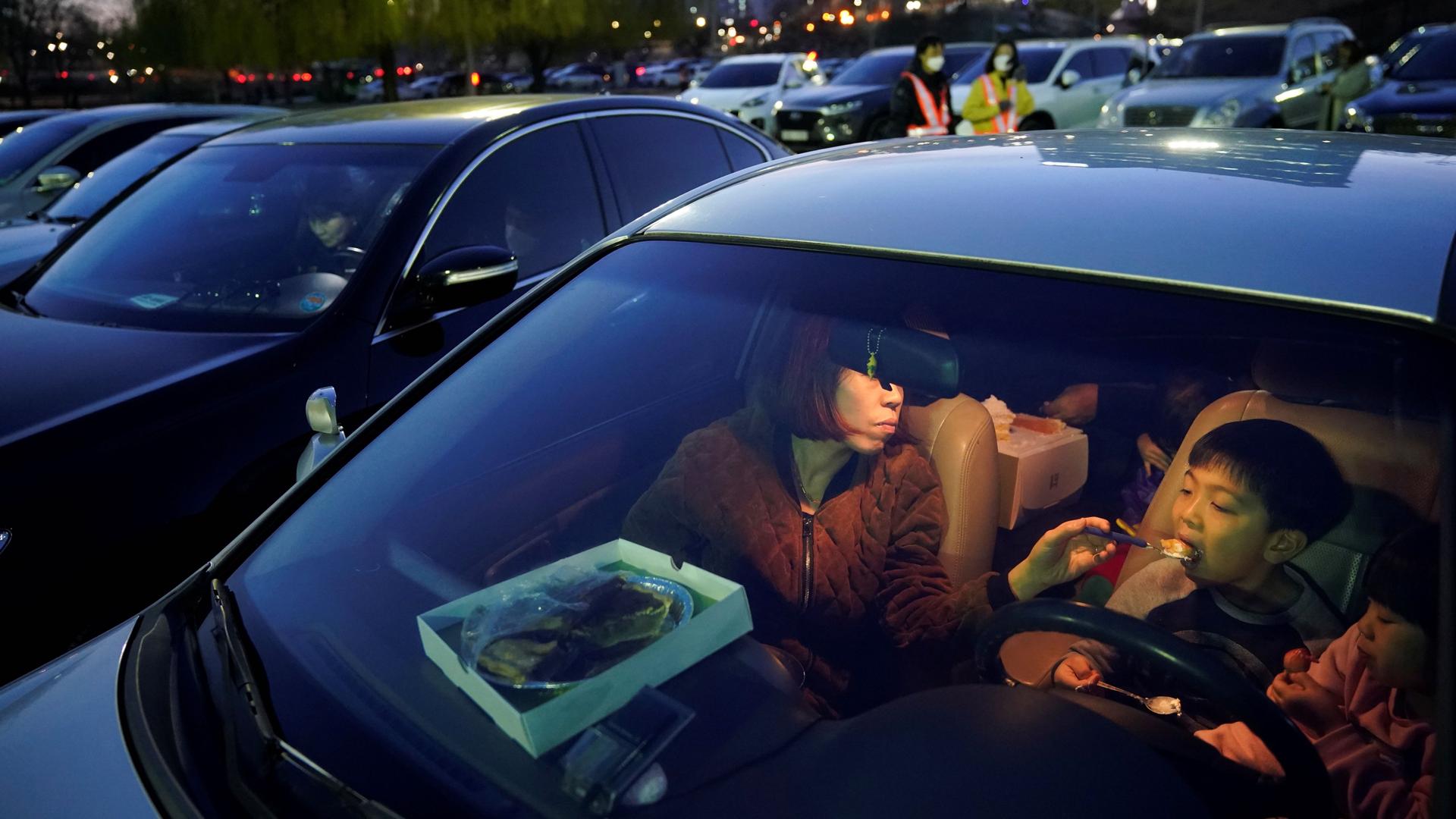Most South Korean movie theaters never closed their doors during the coronavirus pandemic, but many film buffs have instead sought out the big screen from inside the safety of their own cars.
South Korea was one of the first countries to experience a major COVID-19 outbreak in February, and since then, businesses have been asked to implement social or physical distancing safeguards. Multiplexes now limit ticket sales and block off entire rows between guests.
Despite these precautions, the Korean Film Council says audience numbers have hit record lows. But there’s an exception to this box office slump: Drive-in theaters have experienced a recent surge in customers.
Related: Quarantine projects curate pandemic-inspired art
“Since the start of the coronavirus pandemic, we’ve sold around 30% more tickets than we normally do. Normally, most of our guests are young couples, but we’re seeing more families now.”
“Since the start of the coronavirus pandemic, we’ve sold around 30% more tickets than we normally do,” said Park Jae-ho, whose family has operated a Seoul drive-in for around 20 years. “Normally, most of our guests are young couples, but we’re seeing more families now.”
Park’s two-screen theater, which can accommodate up to 240 vehicles, is the capital’s only remaining drive-in. It’s located on a paved-over stream bank adjacent to a highway overpass, and during daylight hours, the lot serves as a go-kart racetrack.
Unlike in the United States, drive-ins in South Korea don’t have a long history — the first opened in the early 1990s.
These outdoor spaces, considered by many as a novelty, had for years been on the decline, according to local media reports. But, with health concerns brought on by the coronavirus, many movie fans now seem to feel safer watching movies through a windshield than inside a theater.
“The pandemic really affected our dating routine.”
“The pandemic really affected our dating routine,” said Kim Jeong-hak, a 35-year-old web designer, who prior to the COVID-19 outbreak, would sometimes catch up to three new movies a week with his girlfriend.
He says the couple have gone to a movie theater just a handful of times since early March, but only when very few other customers were inside.
Lim Yoo-na, his partner, says that it still felt uncomfortable.
Related: Fires, orchestras, parachutes. Some other ways to describe coronavirus — besides war.
“Every time I heard someone cough, I just put back on my mask or moved to another seat farther away,” the 28-year-old baker said.
The couple recently attended a screening of “La La Land” at the Seoul drive-in, which they saw when it was originally released in 2016.
The coronavirus has forced South Korean movie producers to push back release dates of new films, and so now, all theaters are showing repeats, such as movies from the “Avengers” series and 2012’s “Les Misérables.” And this shortage, in turn, adds to the financial woes of many theater operators.
“Without new films, customers won’t come,” said Park, the drive-in owner.
Just two months ago, South Korean cinema was at the top of the world after the dark comedy “Parasite,” directed by Bong Joon-ho, took home the Oscar for best picture — making it the first non-English-language movie to win the top honor at the Academy Awards.
Related: Oscar-nominated ‘Parasite’ speaks to a growing divide in South Korea
Now, the coronavirus is putting the country’s film industry through its “biggest crisis,” said Jason Bechervaise, a Korean cinema critic and scholar at Soongsil Cyber University in Seoul.
But, as South Korea’s COVID-19 cases decline, producers are announcing release dates for some long-awaited films.
“It’s a sign that things are moving in the right direction,” said Bechervaise, who notes that unlike in the United States, China and Europe, many Korean productions never completely shut down.
“It’s a sign that things are moving in the right direction. … It reflects where Korea is in terms of combating the virus.”
“It reflects where Korea is in terms of combating the virus,” he said, adding that it’s miles ahead of many other countries.
Related: Corona Diaries: Open-source project chronicles pandemic life via voice notes
On Monday, the Korea Centers for Disease Control and Prevention reported eight new COVID-19 infections, all brought in from overseas, bringing the country’s total number of cases to 10,801 with 252 deaths. The government is expected to soon relax social-distancing rules.
But, Bechervaise isn’t sure if that means audiences will return to movie theaters en masse because of fears over a second wave of infections.
One theater is trying to ease those concerns by limiting human interaction as much as possible.
CGV, one of South Korea’s largest theater franchises, replaced ticket takers with two roving robots and automated the concession stands at one of its locations at an upscale shopping mall in Seoul last month.
Cho Sung-jin, the company’s strategy support director, says this pilot program could be expanded to other branches if it receives enough positive feedback from customers.
That still might not help CGV’s bottom line, he says.
“Without many new Korean or Hollywood movies, we expect ticket sales to remain low throughout the year,” he said. “But, movies make people feel happy, so we’ll stay open until life returns to normal.”
The World is an independent newsroom. We’re not funded by billionaires; instead, we rely on readers and listeners like you. As a listener, you’re a crucial part of our team and our global community. Your support is vital to running our nonprofit newsroom, and we can’t do this work without you. Will you support The World with a gift today? Donations made between now and Dec. 31 will be matched 1:1. Thanks for investing in our work!
